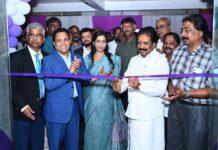Berlin, January 3, 2013 – Bayer HealthCare Pharmaceuticals and Onyx Pharmaceuticals, Inc. today announced that a Phase III trial of Nexavar® (sorafenib) tablets in patients with locally advanced or metastatic radioactive iodine (RAI)-refractory differentiated thyroid cancer has met its primary endpoint of a statistically significant improvement in progression-free survival. The study, called DECISION, evaluated the efficacy and safety of Nexavar compared to placebo. The safety and tolerability were generally consistent with the known profile of Nexavar. Detailed efficacy and safety analysis from this study are expected to be presented at an upcoming medical meeting. Effective treatment options are urgently needed for patients with RAI-refractory differentiated thyroid cancer,” said Dimitris Voliotis, MD, Vice President, Global Clinical Development Oncology, Bayer HealthCare. “We are pleased that the results of this study demonstrate that Nexavar may provide a treatment option for these patients.
Bayer plans to submit these data as the basis for marketing authorization of Nexavar in the treatment of RAI-refractory differentiated thyroid cancer.
About the DECISION Trial
The DECISION (stuDy of sorafEnib in loCally advanced or metastatIc patientS with radioactive Iodine refractory thyrOid caNcer) trial was an international, multicenter, randomized, placebo-controlled study that randomized 417 patients with locally advanced or metastatic, radioactive iodine-refractory, differentiated thyroid cancer (papillary, follicular, Hürthle cell and poorly differentiated) who had received no prior chemotherapy, tyrosine kinase inhibitors, monoclonal antibodies that target VEGF or VEGF receptor, or other targeted agents for thyroid cancer. Patients were randomized to receive 400 mg of oral Nexavar twice daily or matching placebo. At the time of progression, patients receiving placebo had the option to cross over to Nexavar at the discretion of the investigator, based on the patient’s clinical status. The primary endpoint of the study was progression-free survival, as defined by Response Evaluation Criteria in Solid Tumors (RECIST). Secondary endpoints included overall survival, time to progression, response rate and duration of response. Safety and tolerability were also evaluated.
About Thyroid Cancer
Thyroid cancer, one of the few cancers that has increased in incidence over the past several years, is the sixth most common cancer in women, with about three times as many women as men diagnosed. There are more than 160,000 new cases of thyroid cancer and approximately 25,000 people die worldwide each year.
Papillary and follicular types of thyroid cancer are classified as “differentiated” and account for that vast majority of thyroid cancers. While the majority of differentiated thyroid cancers are treatable, RAI-refractory, locally advanced, or metastatic disease is more difficult to treat and is associated with a lower survival rate.
About Nexavar®
Nexavar®, an oral anti-cancer therapy for liver cancer and for the treatment of patients with advanced kidney cancer, is currently approved in more than 100 countries worldwide. In Europe, Nexavar is approved for the treatment of hepatocellular carcinoma and for the treatment of patients with advanced renal cell carcinoma (RCC) who have failed prior interferon-alpha or interleukin-2 based therapy or are considered unsuitable for such therapy.
In preclinical studies, Nexavar has been shown to inhibit multiple kinases thought to be involved in both cell proliferation (growth) and angiogenesis (blood supply) – two important processes that enable cancer growth. These kinases included Raf kinase, VEGFR-1, VEGFR-2, VEGFR-3, PDGFR-B, KIT, FLT-3 and RET.
Nexavar is also being evaluated by Bayer and Onyx, international study groups, government agencies and individual investigators in a range of other cancers.























